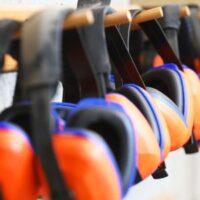What is Occupational Deafness?

Maryland workers in certain types of jobs are subject to regular noises and vibrations that can affect their hearing. Depending on the severity and frequency of an employee’s exposure, they can experience occupational hearing loss and, in some cases, occupational deafness. Occupational hearing loss and deafness result from damage to a person’s inner ear, and that type of damage can make it difficult or even impossible for a person to continue performing certain types of work safely in the future. Under Maryland workers’ compensation, a covered employee who experiences occupational deafness can be eligible for workers’ compensation benefits. Our Maryland workers’ compensation lawyers can tell you more about the types of jobs where this kind of injury most often occurs, and we can also tell you more about seeking compensation.
What Kinds of Jobs Cause Hearing Loss and Deafness?
In order for hearing loss and deafness to be compensable, it must arise out of and occur in the course of an employee’s work. There are certain jobs where employees are exposed routinely to high decibels, including sounds or vibrations, that can damage the inner ear over time. According to the National Library of Medicine, the following are jobs that are known to have a higher risk for hearing loss than others due to the use of heavy machinery, tools, and general work environment:
- Airline ground workers;
- Construction workers;
- Farmers and agricultural workers;
- Workers in the music industry, including at clubs and venues;
- Workers who are routinely around heavy machinery, including warehousing workers and manufacturing workers; and
- Military jobs.
Even large trucks that are approximately five yards away from a worker on a routine basis have a high level of sound intensity, at around 90 decibels. Jackhammers that are three feet away have a sound intensity of 120 decibels, and higher for employees operating them. Jet engines have a particularly significant sound intensity, making airline employees such as baggage and ground workers subject to sounds of 130 decibels and up. Indeed, jet engines reach that high decibel when they are about 100 feet away from a person, and the sound intensity becomes greater as a worker gets closer to a jet engine.
Understanding Occupational Deafness Under Maryland Workers’ Compensation Law
In order to be eligible for workers’ compensation benefits for occupational deafness, you will need to have tests done to show the degree of your hearing loss. According to the statute, hearing loss must be measured “by audiometric instrumentation” that meets scientific standards. Your benefits will then be based on a calculation of the percentage of your hearing loss.
If your average hearing loss is 25 decibels or less, then you do not have compensable hearing loss. If your hearing loss is greater than 25 decibels, you will receive 1.5 percent of compensable hearing loss for every decibel in excess of 25 decibels. Once your hearing loss is determined to be 91.7 or more decibels, then you have a “100 percent compensable hearing loss.” Maryland law uses a formula to determine total decibel loss based on your audiologic results.
Contact a Maryland Workers’ Compensation Attorney
Are you currently suffering from occupational deafness due to job duties you were required to perform over time? If you, you could be eligible to receive workers’ compensation benefits under Maryland law. You should discuss your current health situation and its connection to your previous work experience with one of the experienced Maryland workers’ compensation attorneys at the Law Offices of Steinhardt, Siskind and Lieberman, LLC. We can assess your case for you today and help you to seek workers’ compensation benefits.
Sources:
law.justia.com/codes/maryland/labor-and-employment/title-9/subtitle-6/part-vii/
medlineplus.gov/ency/article/001048.htm


